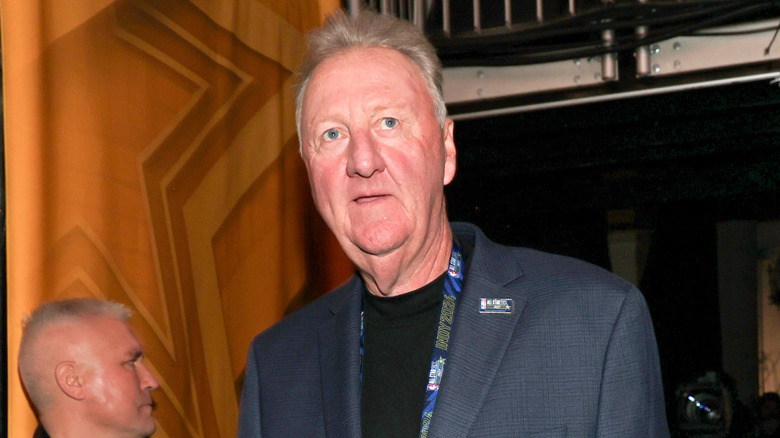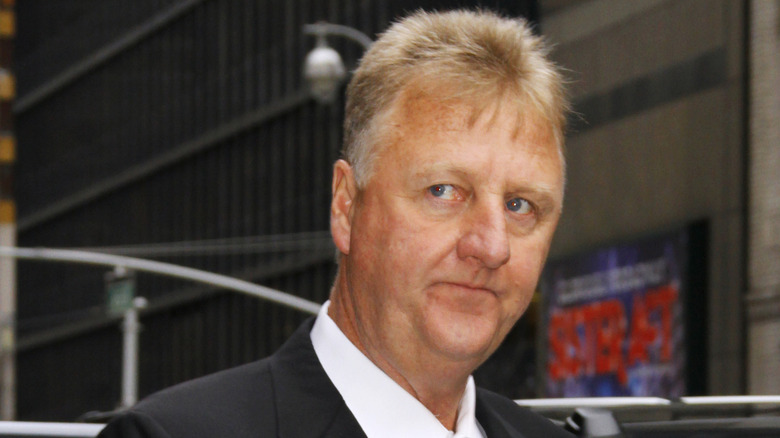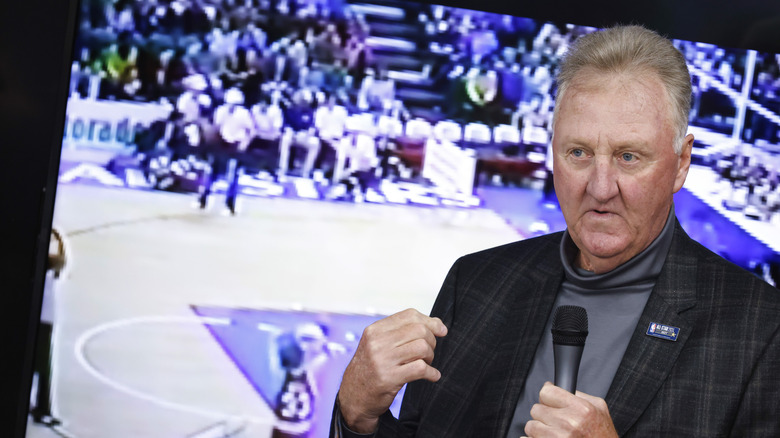Why Larry Bird Has Disappeared From The Public Eye
Larry Bird, one of the greatest basketball players in NBA history, has noticeably stepped out of the public spotlight. Bird is known best for his unmatched (and highly decorated) skills on the court during his time as a player for the Boston Celtics from 1979 to 1992 — and, since retiring as a player, his time as the Indiana Pacers' coach from 1997 to 2000. But where has Bird been in the 25 years since then? His absence from the limelight has been noticeable to fans and analysts alike. However, his retreat from public view doesn't mean he has retired from the game entirely.
Since 2017, Bird has quietly served as an advisor to the Indiana Pacers. As it turns out, he's been maintaining his deep connection to basketball — only in a role that lets him shape the team's future without the pressures of a front-facing position. In this advisory role, Bird has the chance to leverage his decades of experience as a player, coach, and executive to provide strategic insights to the team. With luck, this insight will guide the organization to continued success. It's a role that suits his reserved nature, allowing him to contribute meaningfully without the demands of public scrutiny. Now in his late 60s, this low-profile consulting position feels like a natural fit for a man who has always preferred action over words.
Larry Bird shifted from the court to the office
Larry Bird's decision to step back from the public eye is understandable given the intensity of his earlier roles with the Pacers. As president of basketball operations from 2003 to 2012 and again from 2013 to 2017, he was instrumental in shaping the team's roster and overall strategy. (It's the same role his friend Magic Johnson held with the Lakers, interestingly enough.) Under his leadership, the Pacers saw multiple playoff appearances, including trips to the Eastern Conference Finals. No doubt Bird's experience as a team player himself and his knack for identifying rising talent left a lasting legacy in Indiana and the sport at large. No question he remains one of the most legendary players-turned-executives in NBA history.
Nevertheless, the demands of the role were immense and weighed heavy on Bird. He often spoke about the toll the position took on his health and personal life. "Sometimes my job really sucks," he told the press in 2016 (via The Indianapolis Star). "This is one of the toughest things I've done." His decision to step down in 2012 and again in 2017 shows just how conflicted Bird must have felt about the pros and cons of the gig. Although he relinquished the front office reins for good in 2017, Bird has still continued to contribute to the Pacers in a major way off the court.
Larry Bird has been working behind the scenes since 1992
Larry Bird's leadership journey with the Pacers began all the way back in 1992. Following his retirement from the court, he turned around and joined the organization as a special assistant. In this role, he was able to hone his skills in talent evaluation and strategic planning — effectively setting the stage for his future leadership roles in the years to come. By 1997, Bird had taken on the role of head coach, a position he famously committed to for only three years. "I've been around the history of the game for a lot of years. My experience has been, good coaches leave after three years," he told the press in 2016 while discussing the decision to replace the Pacers' head coach at the time, Frank Vogel (via The Indianapolis Star). "I've seen it. And after a certain number of years, it's time to make a move, and that's how I feel," he added.
True to his word, Bird established the three-year rule when he stepped down in 2000. "It's been a great experience, [but] three years is enough," Bird said (via ESPN). "I'm not cut out to be a coach." Bird was being a bit hard on himself: As coach, Bird helped the Pacers reach the NBA Finals in 2000 — one of the franchise's most successful seasons thus far. He even earned the honor of Coach of the Year in 1998. While he may no longer be front and center in the NBA, his influence on the game endures, quietly shaping the future of the Pacers and the league as a whole.



